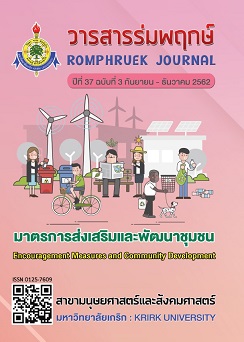Factors Influencing Chinese Tourists Buying Behavior Toward Thai Products
Main Article Content
Abstract
This research investigates the factors that influence consumer buying behavior for made in Thailand products by Chinese tourists. Following a review of the literature, two external factors and one internal factor were identified. The external factors included country of originand social factors. The internal factors were psychological factors. A survey of Chinese tourists (n = 202) was used to test the conceptual framework and hypotheses. The results of the analysis showed that two Country of Origin (COO) factors (technology and human factors) had a significant moderate effect on the consumer buying behavior for made in Thailand products (adj. R2 = .308). However, only family and friends had an effect in terms of social factors, with only a weak predictability (adj. R2 = .191). The internal factors had the strongest effect (adj. R2 = .633), with factors including motivation, perception, and beliefs and attitudes, influencing the consumer buying decision.
Article Details
Every article published in the Romphruek Journal of the Humanities and Social Sciences is the opinion and point of view of the authors. Thery're not the viewpoint of Krirk University or the editored department. Any part or all of the articles for pablication must be clearly cited.
References
Ahmed, S. A., & d'Astous, A. (2008). Antecedents, moderators and dimensions of
country-of-origin evaluations. International Marketing Review, 25(1), 75-106.
Boon-Itt, S., & Rompho, N. (2012). Measuring servcie quality dimensions : An empirical analysis
of the Thai hotel industry. International Journal of Business Administration, 3(5), 52.
Bryman, A., & Bell, E. (2015). Business research methods (4th ed.). New York : Oxford University Press.
Choi, T. M., Liu, S. C., Pang, K. M., & Chow, P. S. (2008). Shopping behaviors of individual tourists
from the Chinese Mainland to Hong Kong. Tourism Management, 29(4), 811-820.
Cooper, D. R., & Schindler, P. (2013). Business research methods (12th ed.). London : McGraw-Hill.
Dombrovski, R., & Hodzic, S. (2010). Impact of value added tax on tourism.
International Business and Economics Research Journal, 9(10), 131-138.
Elliot, G. R., & Cameron, R. C. (1994). Consumer perception of product quality and the country-of-origin effect. Journal of International Marketing, 2(2), 49-62.
Gao, H., Huang, S., & Brown, G. (2014). Making the right decision : An exploratory study of gift purchase behaviour by Chinese tourists. CAUTHE 2014 : Tourism and Hospitality in the Contemporary World : Trends, Changes and Complexity Brisbane Australia, 208-218. .
Hall, C. M. (2014). Tourism and social marketing. London : Routledge.
Han, H., Lee, S., & Lee, C. (2011). Extending the theory of planned behavior : Visa exemptions and
the traveller decision-making process. Tourism Geographies, 13(1), 45-74.
Hoek, J., Roling, N., & Holdsworth, D. (2013). Ethical claims and labelling : An analysis of consumers'
beliefs and choice behaviours. Journal of Marketing Management, 29(7-8), 772-792.
Khan, H., & Bamber, D. (2008). Country of origin effects, brand image, and social status in an emerging market. Human Factors and Ergonomics in Manufacturing and Service Industries, 18(5), 580-588.
Kumar, P., & Ghodeswar, B. M. (2015). Factors affecting consumers' green product purchase decisions. Marketing Intelligence and Planning, 33(3), 330-347.
Lin, L., & Chen, y. (2009). A study on the influence of purchase intentions on repurchase decisions : The moderating effects of reference groups and perceived risks. Tourism Review, 4(3), 28-48.
Mc Clave, J. T., Benson, P. G., & Sincich, T. (2018). Statistics for business and economics (13th ed.).
New York : Pearson.
Ministry of Tourism Sports (2018). Tourism receipts from international tourist arrivals by expenditure item 2017. (April 11, 2018) Retrieved from https://www.mots.go.th/more_news.php?cid=506&filename=index.
Noel, H. (2017). Basics marketing 01 : Consumer behaviour. London : Bloomsbury Publishing.
Pradhan, D., Duraipandian, I., & Sethi, D. (2016). Celebrity endorsement : How celebrity-brand-user
personality congruence affects brand attitude and purchase intentions.
Journal of Marketing Communications, 22(5), 456-473.
Rezvani, S., Dekhordi, G. J., Rahman, M. S., Fouladivanda, F., Habibi, M., & Eghtebasi, S. (2012).
A conceptual study on the country of origin effect on consumer purchase intention.
Asian Social Science, 8(12), 205.
Sharma, P. (2011). Country of origin effects in developed and emerging markets : Exploring the
contrasting roles of materialism and value consciousness.
Journal of International Business Studies, 42(2), 285-306.
Stravinskiene, J., Dauksaite, I., & Dovaliene, A. (2014). Country image formation in the online media : The case
of United Kingdom in the Lithuanian online medi. International Journal of Economic Practices
and Theories, 4(2), 146-161.
Truong, T. L., Lenglet, F., & Mothe, C. (2018). Destination distinctiveness : Concept, measurement
and impact on tourist satisfaction. Journal of Destination Marketing and Management, 8, 214-231.
Verlegh, P. W., & Steenkap, J. B. (1999). A review and meta-analysis of country-of-origin research.
Journal of Economic Psychology, 20(5), 521-546.
Wang, C., Clegg, J., & Kafouros, M. (2009). Country-of-origin effects of foreign direct investment.
Management International Review, 49(2), 179-198.
Wang, X., & Yang, Z. (2008). Does country-of-origin matter in the relationship between brand
personality and purchase intention in emerging economies? Evidence from China's auto industry.
International Marketing Review, 25(4), 458-474.
Wen, Y., & Reinhold, B. (2018). Income and living standards in China. (April 11, 2018) Retrieved from https://www.stlouisfed.org/on-the-economy/2018/january/income-living-standards-china.


